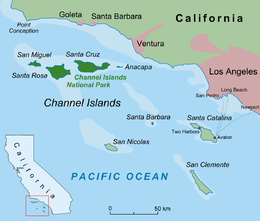Begg Rock
 Begg Rock Begg Rock (California) | |
| Geography | |
|---|---|
| Location | Ventura County California Pacific |
| Coordinates | 33°21′43″N 119°41′42″W / 33.362°N 119.695°WCoordinates: 33°21′43″N 119°41′42″W / 33.362°N 119.695°W |
| Archipelago | Channel Islands of California |
| Highest point | not named |
| Administration | |
United States | |
| Demographics | |
| Population | 0 |
Begg Rock, 15 feet (4.6 m) high, is 8.8 miles (14.2 km) northwest of Vizcaino Point, the west point of San Nicolas Island, Ventura County, California.,[1] United States. It is about 11.5 by 6.7 meters in size, or 61 square meters in area.[2] This island rises abruptly from depths of 50 fathoms (300 ft; 91 m).[3] A reef extends north and south of the island over 100 yards (91 m) in each direction.[4] A lighted whistle buoy is 500 yards (460 m) north of the rock.[5] This rock may be found on NOAA chart 18755.[6] This rock was given its name by the Coast Survey.[7] It was named for the boat, John Begg, which struck a nearby rock in 1824.[8]
Begg Rock is most famous to scuba divers as an extremely exotic, beautiful and challenging dive location that provides opportunity for excellent photography. It extends almost vertically down from above the surface to way too deep. It is actually a number of pinnacles, a couple of which are always above water and a couple that are only exposed at low tide. Being in the open current, it is covered with thick growths of filter feeders. There are not many fish, because the vertical walls have few holes and cracks for fish habitat. The upper part is covered with mussels, green anemones and pisaster starfish. While pretty, it is usually surgey enough to make for difficult diving. Below 40 feet are large areas of brilliantly colored Corynactus anemones (Strawberry anemones). Past about 70 feet are patches of delicate white Metridium anemones. The site used to be famous for large rock scallops. At this location they were attached so solidly to the rocks that they could not be broken off and had to be opened and the inside removed with the upper shell. They did get depleted by hunters, but now Begg Rock is in the no take zone. Diving past 120 feet shows a cold, dark, exotic world. It is so remote and exposed that even if a dive boat schedules to go there, it is only reachable and divable occasionally. This is an advanced dive site where a diver can accidentally get dangerously deep. Currents can be a hazard as well. There are other hazards, but it is a beautiful dive. For some more details, see http://www.diver.net/seahunt/d_begg.htm.
Footnotes[]
- ^ US Dept of Commerce (1997). United States Coast Pilot 7 Pacific Coast: California, Oregon, Washington, and Hawaii. 31st edition. Washington DC: NOAA.
- ^ gauged from online photographs, based on known height
- ^ US Dept of Commerce (1997). United States Coast Pilot 7 Pacific Coast: California, Oregon, Washington, and Hawaii. 31st edition. Washington DC: NOAA.
- ^ US Dept of Commerce (1997). United States Coast Pilot 7 Pacific Coast: California, Oregon, Washington, and Hawaii. 31st edition. Washington DC: NOAA.
- ^ US Dept of Commerce (1997). United States Coast Pilot 7 Pacific Coast: California, Oregon, Washington, and Hawaii. 31st edition. Washington DC: NOAA.
- ^ US Dept of Commerce (1997). United States Coast Pilot 7 Pacific Coast: California, Oregon, Washington, and Hawaii. 31st edition. Washington DC: NOAA.
- ^ Erwin G. Gudde, William Bright (2004). California Place Names: The Origin and Etymology of Current Geographical Names.
- ^ Erwin G. Gudde, William Bright (2004). California Place Names: The Origin and Etymology of Current Geographical Names.
References[]
- US Dept of Commerce (1997). United States Coast Pilot 7 Pacific Coast: California, Oregon, Washington, and Hawaii. 31st edition. Washington DC: NOAA.
- Gudde, Erwin Gustav and William Bright (2004). California Place Names: The Origin and Etymology of Current Geographical Names. Berkeley and Los Angeles, California: University of California Press.
External links[]
NOAA Chart 18755 [1]
- Islands of Ventura County, California
- Islands of Southern California
- Uninhabited islands of California
- Islands of California
- Pacific islands of California

